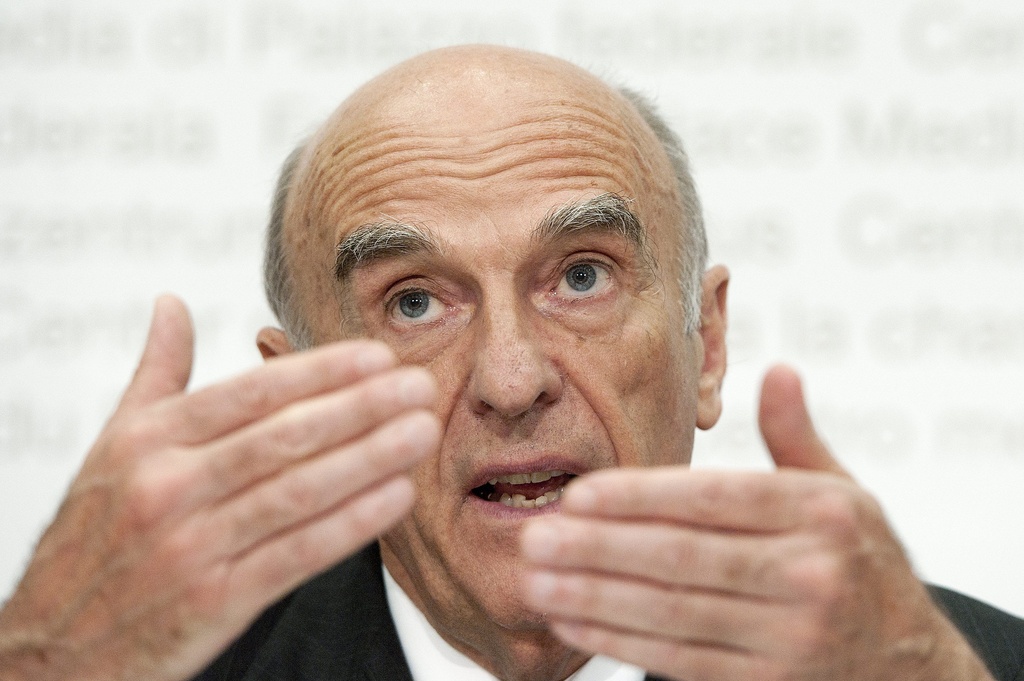
Merz was “better with numbers than crises”

Departing Finance Minister Hans-Rudolf Merz will leave a largely positive legacy on the economy but sometimes fluffed lines under pressure, according to observers.
Merz balanced the national books during the global crisis to achieve a budget surplus last year and oversaw important tax reforms. But he was also blamed for giving away Swiss banking secrecy too easily.
Shortly after announcing his resignation on Friday, Merz was widely acclaimed for steering Switzerland through the recent economic downturn.
He has managed to slash SFr20 billion ($19.3 billion) from the state debt since his appointment at the end of 2003. And while other countries were racking up huge debts from the aftermath of the financial crisis, Switzerland posted a SFr2.7 billion surplus.
“Public finances have been strengthened,” he told journalists at a conference in Bern on Friday. “That has always been my main purpose.”
He added that Switzerland should remain in the black in 2010.
“He was the best finance minister in Europe because he balanced the budget during a very turbulent period,” Hans Geiger, emeritus professor of Zurich University’s Swiss banking institute, told swissinfo.ch.
Business praise
Further praise came from the Swiss Business Federation, economiesuisse, which pointed to reforms that simplified value added tax and other taxes for small and medium-sized enterprises.
Merz, who served as Swiss president in 2009, has emerged from “a presidential year sown with obstacles, amid very difficult international circumstances” with a “very positive” record, economiesuisse director Pascal Gentinetta told the Swiss News Agency.
Switzerland was also better than most other countries at putting out the fires left by the financial crisis, despite its leading bank, UBS, being the worst-hit European financial institution.
But the main credit for bailing UBS out of its difficulties has been handed to the Swiss National Bank, largely because Merz was in hospital recovering from a heart attack during the critical weeks.
The emergency cash injection and the creation of a special stabilisation fund to soak up UBS’s toxic assets were put into place while Merz was inactive.
“The rescue of UBS could not have been better planned and executed, but it bears the handwriting of the Swiss National Bank,” Geiger said.
Banking secrecy breached
But while businesses and the general health of the economy can be thankful for Merz, the financial sector and many of its wealthy clients would not be so happy that the Swiss government played such an important role in weakening Switzerland’s treasured banking secrecy.
Under pressure from the United States, the G20 group of the world’s most powerful countries, the European Union and the Organisation for Economic Co-operation and Development (OECD), Switzerland has been forced to concede ground during a global crusade against tax evasion.
First, Merz was obliged to renegotiate a host of double taxation agreements with various countries. But more damaging to the reputation of Swiss private banking, Switzerland also complied with US demands to hand over details of UBS clients.
The decision taken last year was hasty and ill-considered, according to Geiger. “There was no urgent need to do that and Merz’s department handled that very badly,” he said.
“Switzerland has always promised clients that their data would be protected. It was a bad moment in Swiss history.”
Strong leader needed
Martin Janssen from the Ecofin financial consultancy group believes that Merz’s record for the Swiss economy will end with a positive balance. But he also feels that Merz was left wanting when international pressure was brought to bear on Switzerland.
“He did an excellent job as finance minister and was one of the only ones in Europe to bring down state debt and even record a surplus during the crisis years,” Janssen told swissinfo.ch.
“But he was not a good leader during the banking secrecy affair. He was not well enough prepared and yielded too quickly. Maybe he could not have changed the situation in the end, but Switzerland badly missed a solid strategy and a strong visible leader during that period.”
For his part, Merz has defended his record in the face of brickbats that also extended to his role as president during the Libyan hostage crisis.
“I had to take a lot of criticism,” the 67-year-old said. “I believe a lot of it wasn’t justified. But that’s the way of politics.”
Matthew Allen, swissinfo.ch
Merz, 67, entered politics in 1997 when he joined the Senate as representative of his rural canton Appenzell Outer Rhodes.
In December 2003 he was elected to the cabinet for the centre-right Radical Party.
He held the portfolio of finance minister and also the largely ceremonial post of Swiss president in 2009.
He suffered a heart attack in September 2008 and returned to work six weeks later.
Merz had a career as a management consultant before he entered politics and is considered close to the business community.
Switzerland rode out the worst ravages of the financial crisis and subsequent global recession better than many countries.
In 2008, UBS bank was bailed out with an emergency cash injection and the creation of a Swiss National Bank fund to soak up its toxic assets.
Switzerland also managed to avoid the massive public debts that have been racked up by many other countries. Last year, Switzerland posted a SFr2.7 billion budget surplus.
The Swiss economy is now gaining positive momentum again with gross domestic product expected to grow by 1.8% in 2010.

In compliance with the JTI standards
More: SWI swissinfo.ch certified by the Journalism Trust Initiative


























You can find an overview of ongoing debates with our journalists here . Please join us!
If you want to start a conversation about a topic raised in this article or want to report factual errors, email us at english@swissinfo.ch.